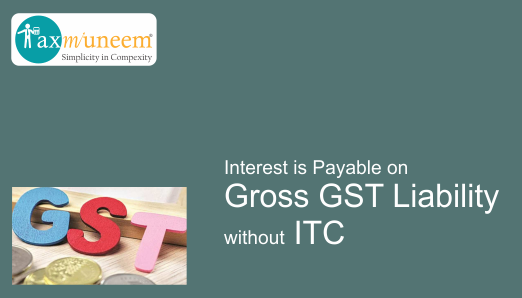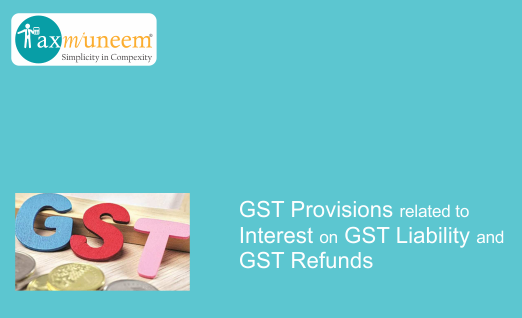Telangana High Court: Interest payable on Gross GST Liability without ITC.
In the previous indirect tax regime, it was a settled principle that interest on late payment of taxes is only payable on the net tax liability i.e. after adjustment of Input Tax Credit. However, in current GST regime, the situation is different and interest is payable on Gross GST liability before adjustment of Input Tax Credit.
Hon’ble Telangana High Court in its recent judgment in the case of M/s. Megha Engineering & Infrastructures Ltd. upheld the revenue’s view that Interest is payable on Gross GST Liability and not on net tax liability. Below is the synopsis of judgment delivered by the High Court.
Facts of the case:
M/s. Megha Engineering & Infrastructures Ltd. (“Petitioner”) is engaged in manufacturing of MS Pipes and in execution of infrastructure projects. Petitioner is registered with GST department and is liable to file monthly returns in form GSTR-3B by 20th of succeeding month.
However, during the period Oct’2017 to May’2018, petitioner could not file its returns within stipulated time period. During the period July 2017 to May 2018, the total tax liability of the petitioner was Rs. 1014.03 crores, whereas the input tax credit entitlement was Rs. 968.58 crores.
Thus, there is a total shortfall of Rs. 45.44 crores which was required to be paid in cash. Petitioner also deposited Rs. 30.92 lakhs as interest on late payment of net GST liability i.e. after adjusting the input tax credit.
GST Department issued letters demanding interest on the Gross GST liability i.e. on 1014.03 crores in accordance with provisions of Section 50 of the CGST Act, thus leading to the present writ petition
Arguments before the court
The Ld. Advocate of Petitioner argued that due to the functionality of GST portal, they cannot file the return even if they can adjust the liability to the extent of 95% by utilizing Input Tax Credit. Petitioner also argued that there was only a few days delay in filing return.
It was further argued that they are liable to pay interest only on the net tax liability i.e. after adjusting ITC available to them.
Petitioner also relied upon the recommendation of 31st meeting of GST council, where in principal approval was given for amendment in Section 50 of CGST Act to levy interest only on net tax liability i.e. after adjusting input tax credit from the total tax liability.
Petitioner further relied upon the judgments delivered in the case of State of Gujarat v. Dashmesh Hydraulic Machinery, dated 19.01.2015, and State of Gujarat v. Nishi Communication, dated 29.01.2015.
Respondents argued that Interest under section 50(1) is not penal in nature and it is a statutory obligation which a taxable person needs to deposit out of its own accord. It was further argued that Section 50(1) is not confined to cash component of the tax payable but it is payable on total tax liability.
Matter before the court to decide
That whether the taxpayer is liable to pay interest on Total tax liability without adjusting ITC or is it only on the net tax liability.
Court observations
The Hon’ble court in its judgment has discussed various provisions on CGST Act in detail before arriving at the decision.
Court observed that a taxable person needs to satisfy all the four conditions stipulated in Section 16(2) in order to be entitled to avail input tax credit. One such condition is that the taxable person must file its return in order to claim the input tax credit. It is upon filing the return, ITC gets credited to the electronic credit ledger on provisional basis for utilization and credit is available for utilization only when it appears in the electronic credit ledger.
Court further observed that until a return no entitlement to credit and no actual entry of credit in the electronic credit ledger takes place. As a consequence, no payment can be made from out of such a credit entry. It is true that the tax paid on the inputs charged on any supply of goods and/services, is always available. But, it is available in the air or cloud. Just as information is available in the server and it gets displayed on the screens of our computers only after connectivity is established, the tax already paid on the inputs, is available in the cloud. Such tax becomes an in-put tax credit only when a claim is made in the returns filed as self-assessed. It is only after a claim is made in the return that the same gets credited in the electronic credit ledger. It is only after a credit is entered in the electronic credit ledger that payment could be made, even though the payment is only by way of paper entries.
Hon’ble Court explained the matter in hand with following example:
“40. Let us look at it from another angle. Suppose a registered person under the Act purchases goods, which have suffered tax, to be used as inputs in the goods to be sold by him. Let us assume that the purchase is made in January and hence the same is reflected in the return filed by February 20. While filing the return in February, the dealer could have taken credit and it is possible that the credit is available in the electronic credit ledger for the month of February. If after some kind of processing, the goods are sold in March, the output tax becomes payable while filing the return by April 20. This payment can be either by way of cash or by way of adjustment against the claim for ITC. The payment is made by way of cheque in the case of the former and by way of a claim made in the return by way of an entry. Only when the payment is so made, the Government gets a right over the money available in the ledger. Since ownership of such money is with the dealer till the time of actual payment, the Government become entitled to interest upto the date of their entitlement to appropriate it.”
Hon’ble court also turned down the arguments of petitioner about recommendations of 31st council meeting on the ground that such recommendation is still on paper and the same has not yet been notified.
Hon’ble court did not accept the judicial precedents in the cases of Dashmesh Hydraulic Machinery Nishi Communication on the ground that both the above stated judgments were issued in VAT regime which have no relation with GST regime.
Decision
Court decided in favor of the revenue and held that interest is payable on total tax liability without adjusting the ITC.
Our Comments
This judgment will lead to series of notices and letters from GST department seeking interest on total tax liability from taxable person who have filed their returns late. It’s a big blow for taxpayers as those who will not be able to file their returns on time due to several reasons, sometimes out of their hands, will now have to incur huge cost on interest despite of having input tax credit with them.
It is expected from the govt. to implement the recommendation of GST council of charging interest only on the net tax liability and not on the total tax and publish a notification of the same in official gazette.
To view the full text of judgment click here.
Related Articles GST Annual Return, GST Rates for Real Estate, RCM in GST
In case of any query or help feel free to contact and you can avail GST Annual return Filing service.
We also provide various services like Private Limited company Registration, Limited Liability Partnership Registration, GST Registration, Accounting Services, Secretarial Compliance, Trademark Registration etc.




